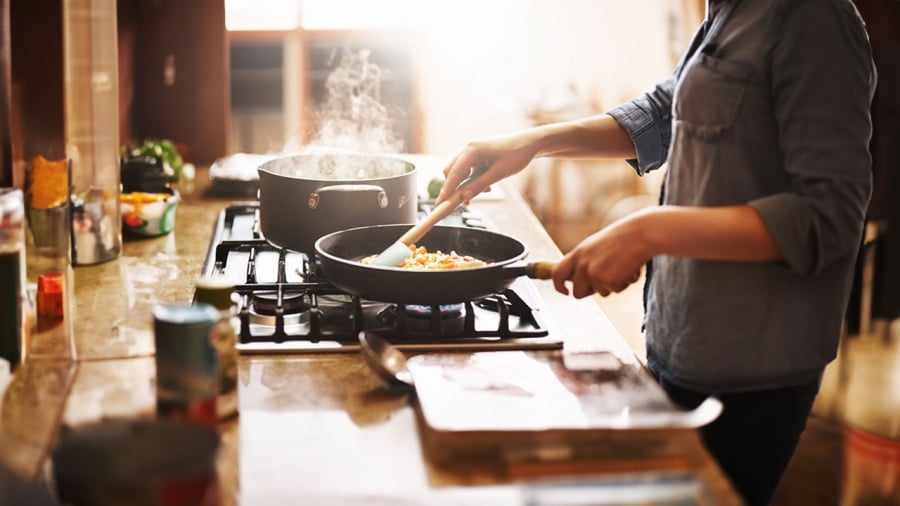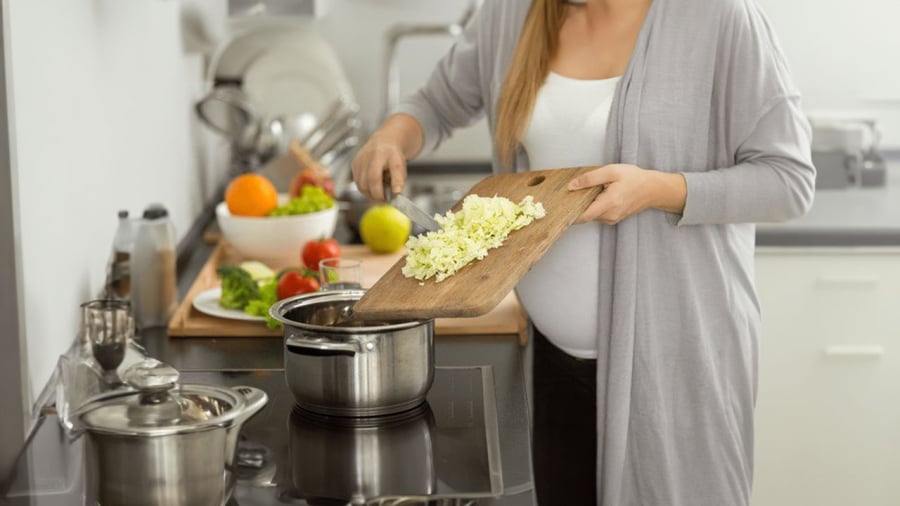In most households, the cost of the kitchen is not small, because that’s where we eat and clean daily. The health of the family also comes from the kitchen. So smart cooking not only helps save money but also ensures food hygiene for a healthy family, thereby increasing happiness while saving costs and avoiding buying medicine, going to the hospital.
That’s why smart cooking is extremely important. Learn the following tips from experienced housewives now:
Turn some flower pots into spice pots
There are many types of herbs that can be grown in small pots at home, such as basil, parsley, garlic… You can grow a few small pots to decorate the kitchen and also use clean and convenient spices without having to go shopping. Did you know that these spices also repel mosquitoes and make the kitchen more beautiful? You can grow them near the window or balcony, or hang them on the wall to save space.
You can also grow sprouts at home with just a few small pots, in 5 days you can have them, both beautiful and fresh and delicious sprouts, unique.

Choose the right cooking utensils
A pot or pan that is the right size for the stove and the food will help you cook faster, save gas, and save electricity. So don’t cook in a pot that is too wide or too small, it will not only make the food taste bad but also consume electricity and energy.
Make natural dishwashing liquid
Most detergents are chemical and toxic and make us waste water several times. You can completely make homemade dishwashing liquid by following these methods: Mix white vinegar with salt and warm water. Mix flour with salt, use lemon peels, basil, lemon grass, etc. as fragrance spices like mint, lemongrass, ginger…. to wash dishes that are both clean and fragrant.
Replace kitchen paper towels with cleaning cloths
Instead of using paper towels to wipe the kitchen, you can use a cloth soaked in vinegar or lemon water, or squeeze the lemon and rub it on the dirty surface, then wipe it with a cloth. Wash the towel and use it repeatedly to help keep your home clean, save money, and protect the environment.
Buy vegetables directly from the growers
Buying vegetables from farmers who grow them themselves can help you save up to 50% off the price and the products are also fresher than through intermediaries. Although it may take time to go and buy, if you can overcome it, this is really worth doing.
Buy a large quantity of some necessary items
There are certain items that must be used and cannot be ignored, such as bathing and shampooing, so buy a large can will be cheaper than buying a small can, because the can has a long shelf life and in the end, you still have to use it.

Save glass bottles and jars
Glass bottles that can be recycled as glass jars should be reused because they are safe and these bottles can be cleaned and used multiple times to store suitable products.
Cook just enough to avoid waste
Don’t let your eyes be greedy and make excess food. Cook a little bit to avoid overeating and food waste.
Cook at home instead of eating out
If you eat at home, it is obviously safer and cheaper than eating out. So equip yourself with some cooking skills to minimize the cost of eating out.
Keep the kitchen clean
A neat kitchen will make you want to cook more. Moreover, with a tidy kitchen, you won’t be overwhelmed and can control the food well to avoid spoilage and waste.
Organize the refrigerator properly
Disorganized refrigerator can quickly spoil food and make you spend more on electricity. So let the refrigerator be 80% full, not too full. Use square containers to store food in the refrigerator to help you easily observe the food, avoid spoilage. Use more stainless steel boxes to make it colder. Always make sure to have an ice tray, a water tray in the refrigerator will help you save electricity and increase the durability of the refrigerator.
Pay attention to unplug the rice cooker plug
After the rice is cooked, you should unplug the rice cooker plug, stir the rice and eat. Do not cook rice too far from mealtime because it will not only make the rice unappetizing, the rice will be hardened, and it will also waste electricity because the rice cooker is plugged in for too long. So set the time to cook rice and dishes close to mealtime.
8 Common Mistakes People Make with Cutting Boards
Are you using your cutting board correctly? Many Vietnamese households rely on cutting boards in their kitchen, but not everyone knows how to use them properly, especially when it comes to wooden cutting boards. Check out these 8 mistakes to avoid when using a cutting board to ensure both hygiene and safety for everyone in your family.





































